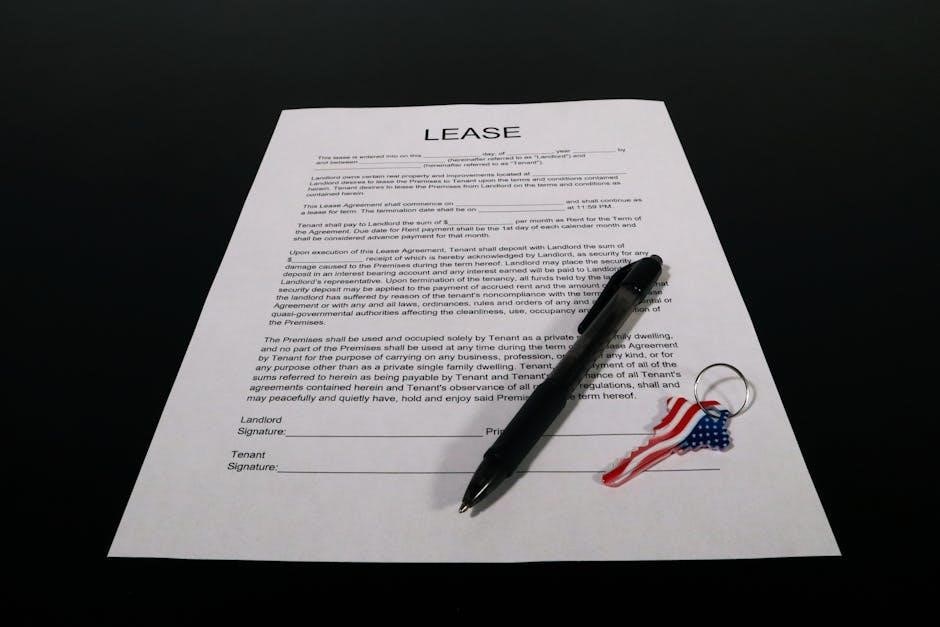What is a Trailer Lease Agreement?
A trailer lease agreement is a legal contract between a lessor and lessee‚ outlining terms for temporary trailer use․ It ensures clarity and legal protection for both parties․
1․1 Definition and Purpose
A trailer lease agreement is a legal contract between a lessor and lessee‚ defining the terms for temporary use of a trailer․ Its purpose is to outline responsibilities‚ usage guidelines‚ and payment terms‚ ensuring both parties are protected and aware of their obligations․
1․2 Key Parties Involved
The primary parties involved in a trailer lease agreement are the lessor (trailer owner) and the lessee (renter)․ The lessor grants temporary use of the trailer‚ while the lessee agrees to terms like payment‚ usage‚ and maintenance‚ ensuring both are legally bound and accountable for their roles․
Why Use a Trailer Lease Agreement?
A trailer lease agreement provides legal protection‚ clarity on terms‚ and financial security for both parties‚ ensuring responsibilities and expectations are clearly outlined and mutually agreed upon․
2․1 Legal Protection for Both Parties
A trailer lease agreement offers legal protection by clearly defining the rights and responsibilities of both the lessor and lessee‚ reducing disputes and ensuring compliance with local laws and regulations․ This safeguards both parties from potential legal issues and financial losses․
2․2 Clarity on Terms and Conditions
A trailer lease agreement provides clear terms and conditions‚ ensuring both parties understand their obligations‚ payment terms‚ and usage restrictions․ This clarity prevents misunderstandings and ensures a smooth‚ professional rental experience‚ protecting the interests of both the lessor and lessee․
2․3 Financial Security and Responsibilities
A trailer lease agreement ensures financial security by detailing rental payments‚ deposits‚ and late fees․ It outlines responsibilities for maintenance‚ repairs‚ and damages‚ protecting both parties from unexpected costs and ensuring accountability throughout the lease term․
Key Components of a Trailer Lease Agreement
A trailer lease agreement includes essential details such as names‚ addresses‚ trailer description‚ lease terms‚ payment schedules‚ and responsibilities․ It provides clarity and legal protection for both parties involved․
3․1 Names and Addresses of Lessor and Lessee
The trailer lease agreement must include the full legal names and complete addresses of both the lessor (owner) and lessee (renter)․ This establishes clear accountability and ensures both parties can be contacted for any legal or operational matters․
3․2 Trailer Description and Identification
The agreement must include a detailed description of the trailer‚ such as its make‚ model‚ year‚ vehicle identification number (VIN)‚ and size․ This ensures clarity and prevents disputes by accurately identifying the leased equipment․
3․3 Lease Term and Rental Payments
The lease term specifies the duration of the agreement‚ such as 24 months‚ and outlines rental payment details‚ including the amount‚ due date‚ and accepted payment methods․ Late fees and penalties for missed payments are also defined to ensure financial obligations are clear․
3․4 Use Restrictions and Prohibited Activities
This section outlines permissible uses of the trailer and prohibits activities deemed unsafe or illegal․ It restricts modifications‚ unauthorized subleasing‚ and use outside agreed purposes‚ ensuring the trailer’s condition and legal compliance are maintained throughout the lease period․ Violations may lead to termination․
3․5 Maintenance and Repair Responsibilities
The lessee is typically responsible for routine maintenance and repairs to ensure the trailer remains in good condition․ Regular inspections and timely addressing of issues are required․ The lessor may outline specific maintenance standards‚ and neglecting these duties can lead to contractual penalties or termination of the lease․ Proper documentation of maintenance activities is often mandated․
3․6 Insurance Requirements
The lease agreement specifies insurance obligations‚ typically requiring the lessee to maintain liability and damage coverage․ The lessee must provide proof of insurance to the lessor․ This ensures financial protection against accidents or damages‚ safeguarding both parties’ interests throughout the lease term․
3․7 Termination and Return Conditions
Termination and return conditions outline the process for ending the lease early and returning the trailer․ The lessee must provide written notice‚ undergo an inspection‚ and pay any applicable fees for damages or excessive wear‚ ensuring the trailer is returned in good condition․

How to Create a Trailer Lease Agreement
To create a trailer lease agreement‚ download a template from a reliable source‚ fill in details like names‚ addresses‚ lease terms‚ and payment conditions‚ and include signatures for validation․
4․1 Steps to Draft the Agreement
Start by selecting a reliable template from platforms like CocoDoc or HandyPDF․ Specify the lessor and lessee details‚ lease duration‚ payment terms‚ and trailer description․ Include usage restrictions‚ maintenance responsibilities‚ and insurance requirements․ Finally‚ conduct a legal review and ensure both parties sign the document in the presence of a notary․
4․2 Importance of Legal Review
Legal review ensures the agreement complies with local laws and protects both parties’ rights․ It verifies the document’s enforceability and addresses potential disputes‚ making it legally binding and safeguarding against future issues․
4․3 Execution and Signing Process
The execution and signing process involves both parties reviewing the agreement‚ ensuring all terms are agreed upon․ Signatures are typically witnessed or notarized‚ finalizing the lease’s legality․ This step ensures mutual understanding and formalizes the agreement․

Where to Find Trailer Lease Agreement Templates
Reliable online platforms like CocoDoc and Handypdf․com offer customizable trailer lease agreement templates․ Legal document websites and consulting an attorney are also excellent sources for standardized forms․
5․1 Reliable Online Platforms
Platforms like CocoDoc and Handypdf․com provide user-friendly‚ customizable trailer lease agreement templates․ CocoDoc offers Google Drive integration for easy editing‚ while Handypdf․com provides free‚ printable templates in PDF‚ Word‚ and Excel formats․
5․2 Legal Document Websites
Websites like CocoDoc‚ Handypdf․com‚ and DexForm offer high-quality trailer lease agreement templates․ CocoDoc provides editable PDFs‚ while Handypdf․com and DexForm offer free‚ downloadable templates in multiple formats‚ ensuring legal compliance and ease of use for users․
5․3 Consulting an Attorney
Consulting an attorney ensures the trailer lease agreement is legally binding and complies with local laws․ They provide customized advice‚ protecting both parties’ interests and preventing potential disputes․ An attorney’s expertise guarantees clarity and enforceability‚ safeguarding rights and obligations throughout the agreement․

Benefits of Using a Trailer Lease Agreement PDF
A trailer lease agreement PDF offers easy customization‚ a professional format‚ and is legally binding‚ ensuring clarity and enforceability while protecting both parties’ interests effectively․
6․1 Easy to Edit and Customize
A trailer lease agreement PDF is simple to modify‚ allowing users to add specific clauses or terms․ Its digital format ensures easy editing via platforms like Google Drive‚ maintaining a professional and standardized look while catering to individual needs․
6․2 Professional and Standardized Format
A trailer lease agreement PDF provides a professional‚ standardized format‚ ensuring all essential sections are clearly presented․ This structure enhances readability‚ maintains a polished appearance‚ and supports legal compliance‚ crucial for official agreements while allowing for necessary customizations to meet specific requirements․
6․3 Legally Binding Document
A trailer lease agreement PDF serves as a legally binding document‚ ensuring both parties adhere to the outlined terms․ Once signed‚ it becomes enforceable under law‚ providing protection for the lessor and lessee by clearly defining responsibilities and liabilities‚ minimizing potential disputes․

Common Mistakes to Avoid
Common mistakes include omitting key clauses‚ unclear terms‚ and neglecting maintenance or insurance details‚ which can lead to legal disputes and financial losses․
7․1 Omission of Critical Clauses
Omission of critical clauses‚ such as maintenance responsibilities or insurance requirements‚ can lead to legal disputes and financial losses․ Ensure all terms are clearly defined to avoid misunderstandings and potential liabilities for both parties involved in the trailer lease agreement․
7․2 Lack of Legal Compliance
A trailer lease agreement must comply with local laws to avoid legal issues․ Failure to include legally required clauses‚ such as liability terms or warranty disclaimers‚ can result in disputes or penalties․ Always ensure the document adheres to relevant legal standards and seeks legal review for compliance․
7․3 Unclear Terms and Conditions
Unclear terms in a trailer lease agreement can lead to misunderstandings and disputes․ Vague language regarding payment terms‚ trailer condition‚ or return requirements often causes confusion․ Ensure all clauses are specific‚ well-defined‚ and legally sound to avoid ambiguity and potential legal issues for both parties involved․
Legal Implications of a Trailer Lease Agreement
A trailer lease agreement holds both parties legally responsible for adhering to the terms‚ ensuring compliance with local laws and providing mechanisms for resolving disputes․
8․1 Liability and Responsibility
The trailer lease agreement outlines the liability and responsibilities of both the lessor and lessee‚ ensuring accountability for damages‚ losses‚ or legal issues arising from the trailer’s use․
8․2 Compliance with Local Laws
A trailer lease agreement must comply with local laws and regulations‚ ensuring the trailer meets safety standards and legal requirements․ Both parties are responsible for adhering to permits‚ registration‚ and other jurisdictional mandates to avoid penalties․
8․3 Dispute Resolution Mechanisms
A trailer lease agreement often includes dispute resolution mechanisms‚ such as arbitration or mediation‚ to address conflicts between the lessor and lessee․ These clauses outline the process for resolving disagreements‚ ensuring a fair and structured approach to potential issues․
Best Practices for Using a Trailer Lease Agreement
Regular inspections‚ maintaining payment records‚ and clear communication with the lessor/lessee are essential for ensuring compliance and avoiding disputes․
9․1 Regular Inspections of the Trailer
Regular inspections are crucial for maintaining the trailer’s condition and addressing potential issues early․ Conduct inspections before leasing and periodically during the agreement․ This ensures both parties are aware of the trailer’s state‚ preventing disputes and ensuring compliance with lease terms․
9․2 Keeping a Record of Payments
Keeping a record of payments ensures transparency and accountability․ Both parties should maintain receipts‚ invoices‚ and bank statements․ This documentation helps prevent disputes‚ verifies compliance with payment terms‚ and provides a clear audit trail for the lease agreement․
9․3 Communicating with the Lessor/Lessee
Effective communication is crucial for a smooth lease experience․ Regular updates on trailer condition‚ payment status‚ and any concerns ensure transparency․ Both parties should maintain open lines of communication to address issues promptly and avoid misunderstandings‚ fostering a positive and cooperative relationship throughout the lease term․
